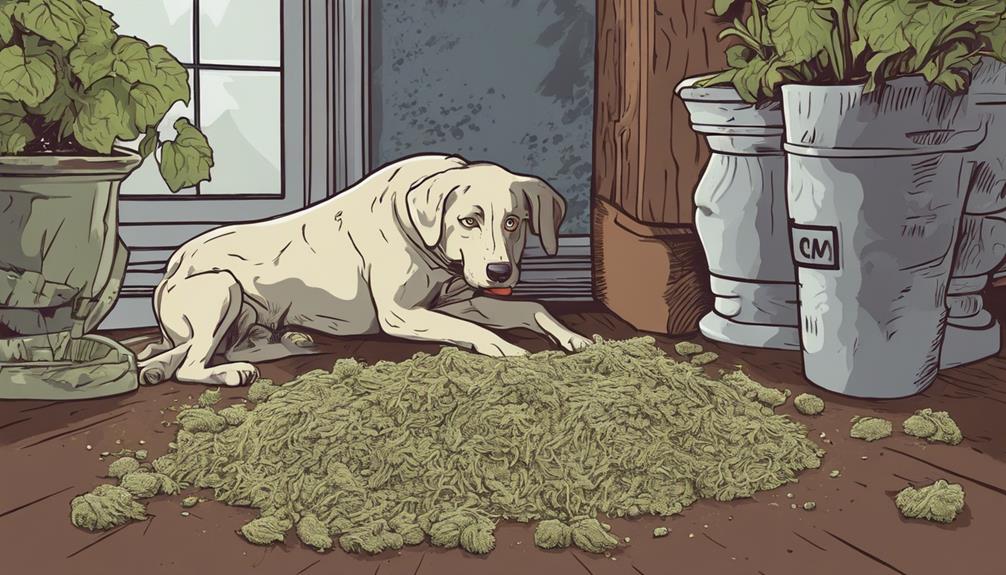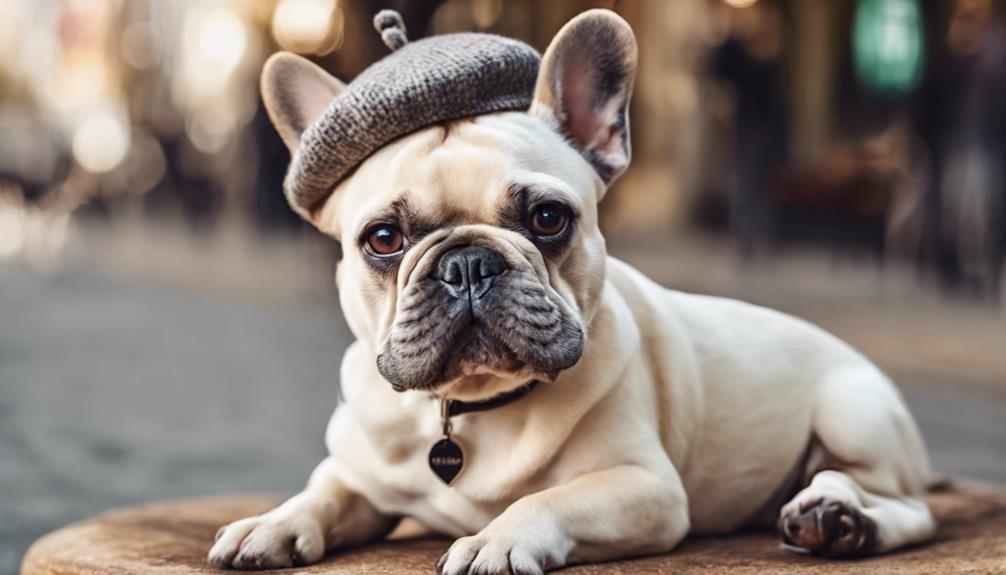Yes, dogs can eat catnip safely in moderation. Catnip can help reduce stress, aid digestion, promote play, induce mild sedation, and repel insects. However, giving too much catnip can upset their stomachs due to essential oils. Consult your vet before giving catnip and watch your dog's reaction closely. Pay attention to the proper dosage, typically ⅛ to ½ teaspoon. Catnip can have calming effects and assist with digestion. Be mindful of the risks and benefits when introducing catnip to your dog. More insights about catnip and dogs can aid in pet care decisions.
Key Takeaways
- Consult a vet before giving catnip to dogs due to potential risks and interactions with medications.
- Start with a small amount of catnip to monitor your dog's reaction and increase gradually.
- Avoid catnip toys designed for cats as they can pose choking and intestinal blockage hazards.
- Moderation is crucial as large doses can cause stomach upset and harm older dogs.
- Catnip acts as a natural sedative for dogs, calming anxiety and aiding digestion when given in recommended amounts.
Potential Benefits of Catnip for Dogs
We've found that incorporating catnip into a dog's diet can offer various benefits, such as reducing stress and anxiety. Catnip's sedative effects can help calm anxious dogs, providing a natural way to alleviate their worries.
In addition, when consumed in moderation, catnip may aid in digestion and soothe upset stomachs in dogs, promoting overall digestive health. Not only does catnip have calming properties, but it can also encourage dogs to engage in exercise and play. This promotes physical activity, keeping your furry friend healthy and active.
Some dogs may experience mild sedation from catnip, which can help them relax after a long day. Moreover, catnip can serve as a natural insect repellent, offering protection from pesky bugs that may bother your canine companion.
With these health benefits in mind, incorporating catnip into your dog's routine can be a positive addition to their overall well-being.
Risks of Giving Catnip to Dogs

Catnip can potentially cause stomach upset in dogs due to its essential oils, so it's important to give it in moderation.
Consulting with a vet before offering catnip, especially in large amounts, is essential to avoid any harm.
Avoid giving catnip toys designed for cats to dogs to prevent choking hazards or blockages in their digestive system.
Dogs Digestive System
In considering the risks of giving catnip to dogs, it is important to understand how their digestive system may be affected. Catnip can aid in digestion for dogs by promoting gastrointestinal health; however, too much catnip, with its potent essential oils, can lead to stomach upset. To prevent digestive issues, it's essential to give catnip to dogs in moderation. Sprinkling small amounts of catnip on dog food is recommended to minimize any risks. Consulting with a vet before introducing catnip to your dog can help guarantee their digestive system remains healthy. Below is a table highlighting the potential effects of catnip on a dog's digestive system:
| Catnip Amount | Effect on Digestive System | Recommendation |
|---|---|---|
| Small | Promotes gastrointestinal health | Sprinkle on dog food |
| Large | May cause stomach upset due to essential oils | Use in moderation |
Behavioral Effects on Dogs
Considering the potential risks of giving catnip to dogs, it's important to understand the behavioral effects this herb may have on our canine companions. Catnip doesn't stimulate dogs like it does cats; instead, it acts as a mild sedative, inducing a calming effect.
The essential oils in catnip can lead to mild sedation in dogs, which can be beneficial for reducing anxiety, particularly before vet visits. Additionally, catnip can aid in alleviating tummy troubles and promoting better sleep patterns in dogs.
While generally important, it's vital to offer catnip to dogs in moderation to prevent stomach upset. Avoid giving catnip in toys to prevent choking hazards and always monitor your dog's reaction when introducing this herb for the first time.
Proper Dosage of Catnip for Dogs

Using the essential dosage of catnip is vital for ensuring the well-being of dogs. When giving catnip to dogs, it's recommended to sprinkle between ⅛ to ½ teaspoon of catnip in their food. However, before introducing catnip to your furry friend, it's important to consult with a vet. Vets can provide guidance on the correct amount of catnip based on your dog's size, age, and overall health. It's important to remember that large doses of catnip can be harmful to dogs, especially older ones, so moderation is key.
Additionally, to keep your dog safe, avoid giving them catnip toys designed for cats. These toys may pose a choking hazard or lead to intestinal blockages if ingested. By following these guidelines and administering the proper dosage of catnip, you can help your dog benefit from its calming and digestive properties. Remember, when it comes to catnip for dogs, a little goes a long way in promoting their well-being.
Effects of Catnip on Dogs

When exploring the effects of catnip on dogs, one can't overlook its potential as a natural sedative that aids in calming anxious pups. Catnip acts as a mild sedative for dogs, helping to alleviate stress and anxiety in our furry friends. Additionally, catnip contains vitamins that can benefit our canine companions. This herb not only has calming properties but can also aid in digestion, making it a versatile natural remedy for our pets.
Moreover, catnip may assist dogs in sleeping better and regulating their sleep patterns. Some dogs might experience mild sedative effects after consuming catnip, which can be beneficial in situations where they need to relax or rest. In addition, catnip serves as a natural insect repellent, offering a dual-purpose solution for both calming effects and pest control for our beloved pups. So, when considering the effects of catnip on dogs, it's crucial to recognize its potential as a calming agent with added health benefits.
Precautions When Offering Catnip to Dogs

When providing catnip to your dog, it's vital to watch their reaction closely. Some dogs may be more sensitive to catnip, so begin with a small amount to assess their response.
Monitoring the intake amount is important to avoid any potential health risks and guarantee a safe experience for your furry friend.
Dogs Reaction to Catnip
As dog owners, we must understand that catnip affects dogs differently than it does cats, acting as a sedative rather than a stimulant. While catnip can help calm nervous dogs in anxiety-inducing situations, precautions must be taken when offering it to our canine companions. It's important to avoid giving dogs catnip toys meant for cats to prevent choking hazards. Consultation with a vet is essential to determine the proper dosage of catnip for dogs, especially since large doses can be harmful, particularly for older dogs. Catnip can be beneficial for dogs with anxiety or during stressful situations when given in small amounts to prevent adverse effects.
| Precautions When Offering Catnip to Dogs | ||
|---|---|---|
| Catnip acts as a sedative for dogs. | Avoid giving catnip toys meant for cats. | Consult a vet for proper dosage. |
Potential Health Risks
To ensure the safety of our canine companions, it's essential to be mindful of the potential health risks associated with offering catnip to dogs. While catnip is generally safe, it's crucial to be aware that some dogs may experience stomach upset if given large amounts due to its essential oils.
Additionally, before introducing catnip to your dog, consult with a vet first, especially if considering larger doses. Catnip is known to contain vitamins and possess antibacterial and healing properties, but moderation is key. Although catnip can have calming effects on dogs, excessive consumption should be avoided to prevent any potential harm.
Monitoring Intake Amount
Carefully monitoring the amount of catnip given to dogs is essential to prevent potential harm, especially in older dogs. When offering catnip, remember:
- Start Small: Begin with a conservative amount, like sprinkling ⅛ to ½ teaspoon in their food.
- Avoid Cat Toys: Refrain from giving your dog cat toys with catnip to prevent choking or intestinal blockages.
- Consult Your Vet: Before introducing catnip to your dog, consult your veterinarian for guidance on the appropriate amount and any potential risks.
Catnip Toys and Dogs: Safety Concerns

When coming across catnip toys intended for cats, dog owners must be vigilant about the potential safety hazards they pose to their canine companions. Catnip toys can be a choking risk for dogs if ingested, leading to serious consequences such as intestinal blockages.
It's important to understand that dogs shouldn't be given catnip toys intended for cats due to these safety concerns. Chewing on catnip toys can result in harm to your furry friend, so it's vital to keep such toys out of reach to prevent any hazards.
Remember that the well-being of your dog is a top priority, and being aware of the risks associated with catnip toys is key to ensuring their safety. By being proactive and keeping these toys away from your dog, you can help prevent any potential accidents or health issues that may arise from ingesting or playing with catnip toys intended for felines.
Catnip Vs. Dognip: Key Differences

When comparing catnip to dognip, it's important to grasp the key differences in how these plants affect our feline and canine companions.
- Catnip contains nepetalactone oil, which triggers euphoric feelings in cats but acts as a sedative for dogs, calming them in stressful situations.
- The effects of catnip have an opposite effect on cats and dogs, with cats becoming more excited and playful, while dogs tend to feel relaxed and subdued.
- While catnip is rich in beneficial vitamins C and E for both cats and dogs, it should be given sparingly to dogs, especially older ones, to prevent any potential harm from overconsumption.
Understanding these distinctions can help pet owners make informed decisions about using catnip or dognip with their furry friends.
Consulting a Vet About Catnip for Dogs

Before introducing catnip to your dog, seeking advice from a vet is essential to ensure their safety and well-being.
Vets can help administer catnip to your dog by providing customized guidance tailored to your furry friend's health condition and specific needs. They can determine if catnip is appropriate for your dog and recommend the correct amount to avoid any potential risks.
Additionally, vets can advise on possible interactions with other medications or supplements your dog may be taking, ensuring a safe and positive experience with catnip.
By consulting a vet about catnip for dogs, you can make informed decisions that prioritize your dog's health and happiness.
Seeking professional guidance is vital in incorporating catnip into your dog's routine safely, as vets have the expertise to offer the best recommendations for your pet. Trusting their knowledge and experience will help you navigate the world of catnip for dogs confidently and responsibly.
Incorporating Catnip Into Your Dogs Routine

After consulting a vet about catnip for dogs, incorporating this herb into your dog's routine can provide calming effects and promote overall well-being. When introducing catnip to your furry friend, it's crucial to start with small amounts to gauge their reaction and make sure they tolerate it well.
Here are some tips to safely incorporate catnip into your dog's routine:
- Start Slow: Begin by offering a tiny amount of catnip to observe how your dog responds. Gradually increase the quantity if they enjoy it without any adverse effects.
- Monitor Behavior: Keep an eye on your dog after giving them catnip to see if it helps them relax or if they show any signs of discomfort.
- Consult Your Vet: Before making catnip a regular part of your dog's routine, consult your vet for guidance on the appropriate dosage and frequency.
Frequently Asked Questions
What Happens if Dog Eats Catnip?
If a dog eats catnip, it may experience mild sedative effects due to the calming properties of catnip. Catnip can help alleviate anxiety and stress in dogs, making it beneficial in anxiety-inducing situations.
Dogs may also experience improved digestion when they eat catnip, as it aids in digestion and can soothe upset stomachs. The effects of catnip on dogs are opposite to those on cats, acting as a calming agent rather than a stimulant.
How Much Catnip Can I Give My Dog?
We can give our dogs ⅛ to ½ teaspoon of catnip sprinkled over their food after consulting with a vet. It's important to determine the appropriate dosage for our furry friends. Remember, too much catnip can harm older dogs, so moderation is key.
To avoid choking or blockages, steer clear of catnip toys meant for cats. When given in right amounts, catnip can calm dogs, aid digestion, and improve sleep quality.
What Are the Benefits of Catnip for Dogs?
Catnip offers various benefits for dogs. It contains minerals and vitamins that promote health and can help with digestive issues.
The essential oils in catnip aid in calming anxiety and improving sleep. It's safe for dogs to ingest in moderation, acting as a mild sedative in stressful situations.
Consult a vet for proper dosage, especially for older dogs, to guarantee their well-being.
Is Doggijuana the Same as Catnip?
Doggijuana isn't the same as catnip. While catnip is specifically for cats, Doggijuana is a herbal blend designed for dogs. It aims to provide a calming effect without the stimulating effects of catnip on cats.
Doggijuana is made with safe, natural ingredients tailored to meet the unique needs of dogs. This blend can help with anxiety, stress, and relaxation. It's important to understand the differences between these two products when considering them for your furry friend.
Conclusion
To sum up, while catnip may seem like a fun treat for your dog, it's important to remember that not all pets will react the same way. Consulting with your vet before introducing catnip to your furry friend is always a wise decision.
Remember, just because cats love it doesn't mean it's safe for dogs. Keep your pet's well-being a top priority and make informed choices when it comes to their diet and enrichment options.










